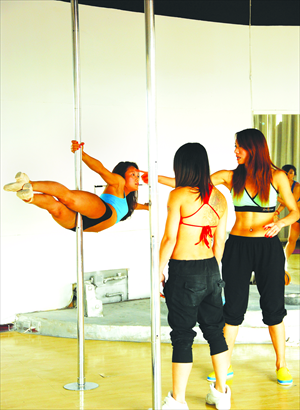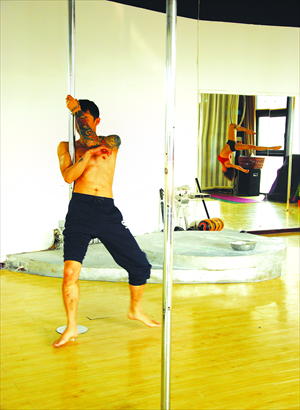Climbing to the top of the pole


The training room is not big, but the dancers inside focus intently, in their own space. Song Yao, 26, from Sichuan Province, second place winner in 2011's China Pole Dance Championship, approaches the pole, carefully wiping it. Meanwhile, Meng Yifan, 28, the first Chinese to be invited to the World Pole Dance Sport Fitness Championship (WPDSFC) in 2010, sits on the floor to stretch, reaching her hands to her toes.
Cao Nuo, 22, from Heilongjiang Privince, third place winner in the 2011 China Pole Dance Championship, practices with a large ring, head down and legs stretched to the ring. Later, the team's only male member, Yan Shaoxuan from Beijing, arrives and quickly begins warming up.
A few years ago, these young dancers were strangers to each other. They came from different areas in China and had various jobs. Two months ago, they grouped together with a few other alternate team members to form China's national pole dance team, led by their leader and coach Yuan Biao. Now, they practice an average of six hours a day to prepare for their first international competition, the WPDSFC, in Zurich, Switzerland on November 10.
Accidental love
For the three girls, an accidental discovery of pole dance videos online led to a change in career. Meng used to be a professional dancer and teacher who specialized in ethnic dances and ballet. In 2006, Meng saw a video of a woman performing a pole dance online. She found it appealing, and she decided to learn it herself. Meng bought a pole online and installed it at home.
"It was difficult at the beginning. Without a coach, I fumbled through the skills and techniques by myself," said Meng.
Song and Cao, living in different cities, shared similar experience after watching videos online. They decided to pursue pole dance as a hobby.
Song was a singer who made her living by performing at various events. Living in a small city in Sichuan, Song was unaware of this art. She became hooked the first time she saw a video of a girl dancing.
"I thought it was so beautiful. Maybe just because the girl in the video was pretty," she laughed.
Luckily, by the time Song and Cao became interested in pole dance in 2008, there were a number of gyms offering classes in China. After practicing for months, both changed roles, from student to coach.
Yan's story is a bit different. In 2005, he saw a pole dance at a nightclub. Experienced in ballet and Chinese dance, Yan, a lover of challenges, wanted to try this new art. He approached the dancer that night and asked to be his student. "After developing the love and skill for pole dancing, I didn't practice other dances," said Yan.
International criteria
Around the same time, Yuan Biao, then a lawyer, also started to become interested in pole dance. Instead of learning the skills or poses, he was more interested in the mechanical principles and criteria for international competition. He emailed the World Pole Dance Federation to discuss the criteria for pole dance competitions.
In 2010, one of Meng's online dance videos was viewed by the World Pole Dance Federation. Throughout the seven years of the World Pole Dance Championship, there had not been a single Chinese candidate.
Meng was invited that year as the first Chinese competitor, and she ranked among the top 24. In the same year, Yuan was authorized to bring the pole dance championship to China and select contestants for international level competitions. Gathering top dancers, he organized the first and second China Pole Dance Championship.
Currently, as the coach and leader of the team, he advises performers on music choices, poses, choreography and other relevant fields.
"He doesn't dance but he knows more, and that's enough," said Cao.
Changing perceptions
Pole dancing is often stigmatized by the conservative public in China. For most pole dancers, changing preconceived notions their loved ones have about the art is part of the process. The first China Pole Dance Championship was a life-changing experience for almost all the candidates.
"My parents are very traditional. They were opposed to me learning pole dancing at the beginning. When I won a prize at the championship and they saw how I danced, they changed their attitude," said Cao.
Song said her performance during the championship changed both her family's attitude and local impressions, as the local TV station of her hometown broadcast the competition.
After the competition, pole dance classes took off at gyms. According to Yuan, there are thousands of pole dance clubs in China now, and about 300,000 to 400,000 people teaching or learning the art.
Yuan thinks people would change their impressions of the art after watching a real performance. His objective as a member of the world pole dance federation is to make it an Olympic game event and to stage more official competitions in China.
"We are called a national team, but not in a real sense. Yes, we select the best dancers based on world standards, but the support and scale is not comparable to other athletic activities," said Yuan.
Though the team has to cover their own costs in Switzerland, they see this chance as an opportunity to learn from the world's top dancers.